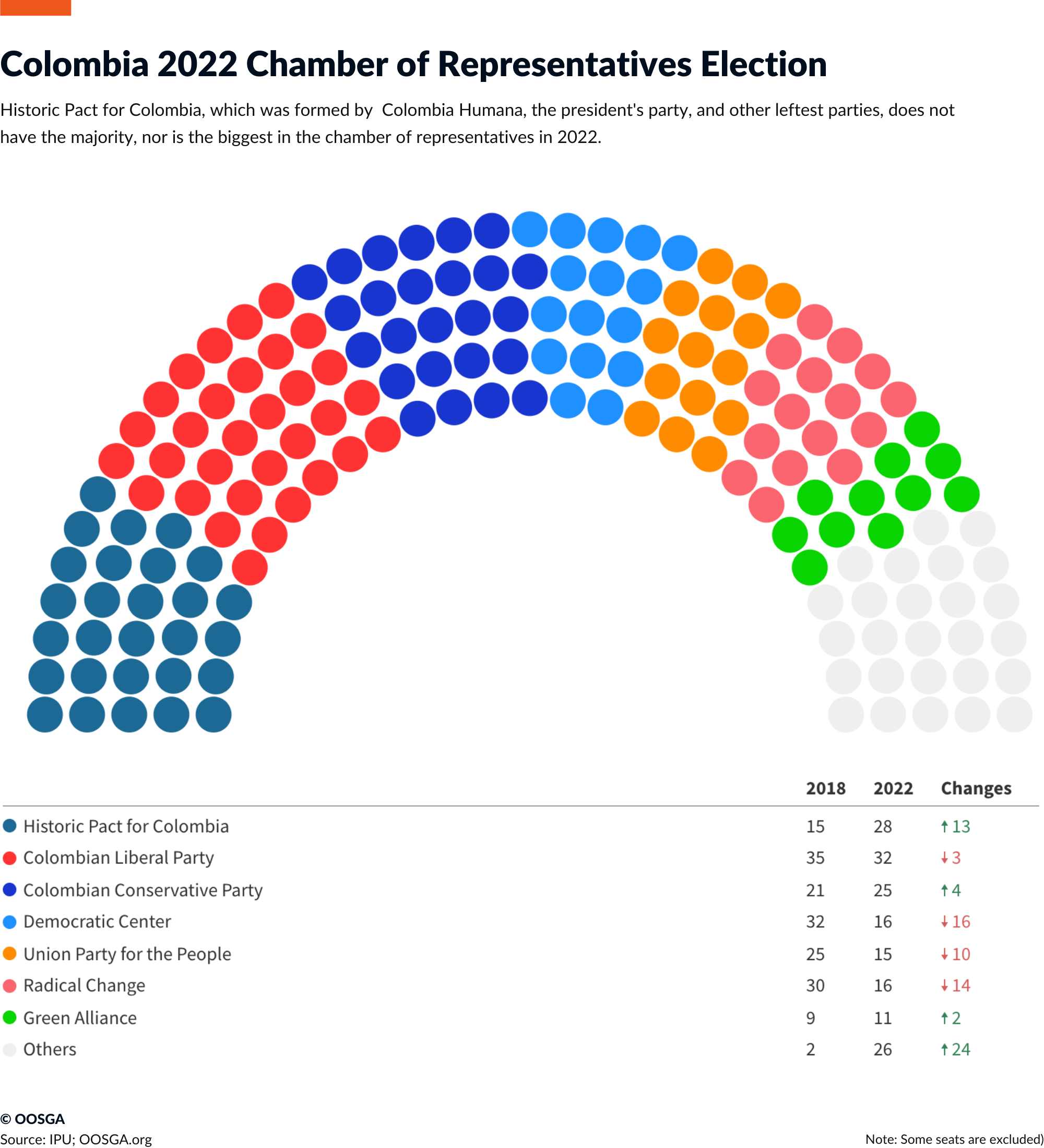Connect With Authors
*Your message will be sent straight to the team/individual responsible for the article.
Colombia has had a history of political violence since it became a republic in 1819. The power-sharing deals between liberals and conservatives in the 1960s were unable to address the country’s development needs, leading to the emergence of leftist rebel groups. Peace talks with the FARC guerrillas resulted in an agreement in 2016 and a revised agreement was approved by Congress in 2020. Talks with the Ejército de Liberación Nacional (ELN) guerrilla group, which were paused in 2019, resumed in November 2022. Colombia is a unitary republic with a president at the head of the executive branch and Congress comprising the Senate and the Chamber of Representatives holding legislative power. The judicial system includes several courts.
The new government under Gustavo Petro will focus on expanding the state’s role in the economy through increased social spending, greater state intervention, and increased protectionism. The government will prioritize compensation for poor families affected by high inflation rates, likely through raising the value of cash transfers. Although some uncertainty regarding the direction of policymaking persists, the president’s moderate stance is expected to prevent radical changes. The diluted tax reform that Congress approved in November 2022 and the preliminary discussions regarding the pension system reform suggest a pragmatic approach by the Petro government. However, the proposed measures against the oil industry may hamper investment and oil production, having significant repercussions for economic growth.
The fiscal consolidation under Mr. Petro is expected to be slow, and he has pledged to use the proceeds from the tax reform to boost social spending rather than strengthening the public finances. The president’s moderate stance has been reflected in the diluted tax reform that Congress approved in November 2022. Despite the inconsistent statements by members of the ideologically heterogeneous cabinet, the president’s campaign promises suggest that policy changes will be less radical. The government plans to reform the country’s mixed pension system to improve the sustainability of the deficit-saddled public-sector pillar and introduce a benefit for about 3 million elderly people who are not currently entitled to a pension. The original proposal by Mr. Petro, however, has raised concerns in financial markets regarding the viability of private pension operations and the government’s fiscal results. The mandatory contribution threshold for the public system may be lowered to reduce the strain on private funds.
The area of greatest concern regarding Mr. Petro’s economic policies is the changes in the oil industry. The hydrocarbons industry is the most affected by the recently approved tax reform and the possible suspension in the issuance of new contracts for oil exploration. These measures will hamper investment and oil production, with significant repercussions for economic growth. The president’s commitment to reducing Colombia’s reliance on oil and coal is expected to involve stricter regulations for the mining sector, risking weaker economic growth than currently forecasted.
-21.45 Billion
-6.2 %
-6.2 %
60.4 %
Colombia’s leftist candidate Gustavo Petro has won the presidential election with over 50% of the vote, making him the first leftist president in the country’s history. Petro, a former rebel and senator, has pledged to transform the country’s economic system and tackle issues such as poverty, inequality, and lack of opportunity that have led to widespread discontent in the country. His ambitious economic plan includes halting all new oil exploration, developing other industries, and expanding social programs, while imposing higher taxes on the rich.
Petro’s victory is significant because of the country’s history of fighting a brutal leftist insurgency, known as the Revolutionary Armed Forces of Colombia (FARC). The peace deal signed with FARC in 2016 opened up space for a broader political discourse, paving the way for the emergence of a legitimate left. Petro will take office in August and will face pressing issues with global repercussions, such as a lack of opportunity, rising violence, deforestation in the Colombian Amazon, and threats to democracy.
The upcoming local elections on October 29th could make it difficult to govern as both the ruling PH and centrist parties will present their own candidates. This could lead to a break-up of Mr. Petro’s large working coalition. However, if the government’s proposed political reform is approved, the PH may have a stronger position in the elections, as it could attract credible legislators from other parties to stand in municipalities with large budgets.

-
48
-
45
1.55 $
4.13 $
443 $
0.9525 %